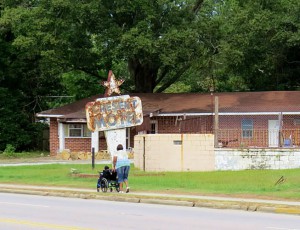Nonfiction by Paul Theroux
Reviewed by Andy Brack | Noted travel writer and novelist Paul Theroux’s new book about our region, Deep South, causes me to have very mixed reactions. On more than one occasion, I wondered, “Where does this guy get off saying that?” And I grab the book and want to hurl it through the window. These fits particularly came after one of Theroux’s elitist, degrading attempts at phonetically capturing the Southern accent.
But the book also shows he’s a great storyteller who occasionally makes an interesting observation. “Well, that’s a good point,” I would think. “Don’t get rid of it yet.” And I kept reading.
For 50 years, Theroux, who is obviously not from around here, has traveled the corners of the earth — India, Zimbabwe, Kenya, Patagonia and China. But he realized he knew little about a lot of his own country, particularly the American South.
“I made it my habit to drive past the buoyant cities and obvious pleasures in favor of smaller places and huddled towns, to meet the submerged twenty percent,” he wrote, explaining why he bypassed the prosperous South of Charleston and Hilton Head Island.
In doing so, he got an incomplete picture of today’s South. He found cliché and decay. He found desolation, poverty, hopelessness and hunger in rural South Carolina, Alabama, Mississippi, Arkansas and elsewhere. It’s almost as if he found the South to be a highly-functioning alcoholic, but he only focused on the disease, not any of the good.
About a third of Deep South is about South Carolina and includes stories about the Orangeburg Massacre, Strom Thurmond, drunks at the Aiken Steeplechase and attending black church services. But Theroux’s focus in the Palmetto State is on the desolation and desperation of Allendale. He fixates on how Indians run convenience stores and a motel.
Despite the book’s narrowness, Theroux got a couple of things right. He found Southerners — from gun nuts to the poor — to be hospitable and kind. And he understood many poor areas are having a tough time economically because of how mechanization hurt family farms and how big American businesses shifted the only jobs left in rural areas to other counties.
If you must, read Deep South. But the 441-page book can be summarized simply: People in the rural South are good folks, but a lot of them are poor. (Thanks. We know that.)
- EDITOR’S NOTE: This is an excerpt of a longer review published last week in Statehouse Report. To read the full review, click here.




 We Can Do Better, South Carolina!
We Can Do Better, South Carolina!
























